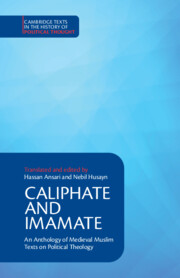Refine search
Actions for selected content:
10 results
Chapter 12 - Section on the Law of Rebellion from the Radd al-Muḥtār of Ibn ʿĀbidīn (d. 1252/1836)
- from Part II - Islamic Jurisprudence (Fiqh) and Related Genres
-
-
- Book:
- Islamic Law in Context
- Published online:
- 14 November 2024
- Print publication:
- 21 November 2024, pp 132-140
-
- Chapter
- Export citation
Chapter 10 - ‘The Treatise of Refutation of those who Criticise [Our] Conduct’ (Kitāb al-Radd ʿalā man Ṭaʿana fī l-Sīra) Attributed to Imām al-Mutawakkil ʿalā Allāh, Aḥmad b. Sulaymān (d. 566/1170)
- from Part II - Islamic Jurisprudence (Fiqh) and Related Genres
-
-
- Book:
- Islamic Law in Context
- Published online:
- 14 November 2024
- Print publication:
- 21 November 2024, pp 106-120
-
- Chapter
- Export citation
2 - The Succor of Nations amidst the Confusion of Darkness by al-Juwaynī
- from Selected Theological Writings
-
- Book:
- Caliphate and Imamate
- Published online:
- 19 October 2023
- Print publication:
- 02 November 2023, pp 19-41
-
- Chapter
- Export citation
Introduction
-
- Book:
- Caliphate and Imamate
- Published online:
- 19 October 2023
- Print publication:
- 02 November 2023, pp x-lxii
-
- Chapter
- Export citation
7 - The Crown of Doctrines and the Mine of Instructive Points by al-Dāʿī Ibn al-Walīd
- from Selected Theological Writings
-
- Book:
- Caliphate and Imamate
- Published online:
- 19 October 2023
- Print publication:
- 02 November 2023, pp 148-156
-
- Chapter
- Export citation
3 - The Theoretical Underpinning of the Imamate by Abū Ṭālib al-Hārūnī
- from Selected Theological Writings
-
- Book:
- Caliphate and Imamate
- Published online:
- 19 October 2023
- Print publication:
- 02 November 2023, pp 42-66
-
- Chapter
- Export citation
5 - The Book of Excellence on the Fundamental Principles of Religion by Ibn al-Malāḥimī
- from Selected Theological Writings
-
- Book:
- Caliphate and Imamate
- Published online:
- 19 October 2023
- Print publication:
- 02 November 2023, pp 107-139
-
- Chapter
- Export citation
6 - The Concise Book of Doctrines by ʿAbd al-Kāf ī al-Warjalānī
- from Selected Theological Writings
-
- Book:
- Caliphate and Imamate
- Published online:
- 19 October 2023
- Print publication:
- 02 November 2023, pp 140-147
-
- Chapter
- Export citation
4 - The Curative Book on the Imamate: A Paraphrastic Rendering by al-Shaykh al-Ṭūsī
- from Selected Theological Writings
-
- Book:
- Caliphate and Imamate
- Published online:
- 19 October 2023
- Print publication:
- 02 November 2023, pp 67-106
-
- Chapter
- Export citation

Caliphate and Imamate
- An Anthology of Medieval Muslim Texts on Political Theology
-
- Published online:
- 19 October 2023
- Print publication:
- 02 November 2023
